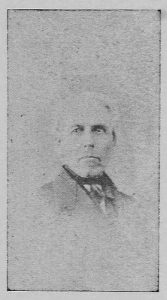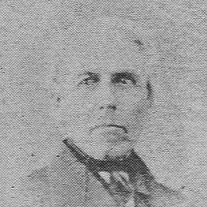 Robert was born the second son of John and Isabella Cunningham McCachren at the Forks of Brandywine, Chester County, Pennsylvania, September 24, 1798. When he was ten years old his father died leaving his mother with little means to care for her family, but despite financial limitations Robert grew up a devoted student taking advantage of the educational opportunities available as he pursued the best schooling possible. When Rev. John B. Grier, a graduate of Dickinson College, opened a classical school at Brandywine Manor Robert became a student learning Latin and Greek while developing a keen interest in higher mathematics. Grier relocated his school to a site too far from Robert’s home so he continued his college preparation with Rev. James W. Magraw in West Nottingham, Pennsylvania. For college he went west to Carlisle attending Dickinson beginning in 1823 but he did not graduate. Possibly, the financial limitations of his upbringing continued and the distance to the Dickinson campus taxed his budget, which seems confirmed by his working a short time after Dickinson before attending seminary. He taught in an academy in Newark, Delaware until starting his divinity program in Princeton Theological Seminary completing the full three-year program in 1827. It should be noted that he finished the full program in an era when students often studied only a few years or less but were none the less licensed and ordained by their presbyteries despite the standards of the church. Among his class colleagues were a future professor in New York’s Union Seminary, Henry White; pastor, writer, and seminary professor William Swan Plumer; and Congregationalist minister and university professor Cyrus Mason.
Robert was born the second son of John and Isabella Cunningham McCachren at the Forks of Brandywine, Chester County, Pennsylvania, September 24, 1798. When he was ten years old his father died leaving his mother with little means to care for her family, but despite financial limitations Robert grew up a devoted student taking advantage of the educational opportunities available as he pursued the best schooling possible. When Rev. John B. Grier, a graduate of Dickinson College, opened a classical school at Brandywine Manor Robert became a student learning Latin and Greek while developing a keen interest in higher mathematics. Grier relocated his school to a site too far from Robert’s home so he continued his college preparation with Rev. James W. Magraw in West Nottingham, Pennsylvania. For college he went west to Carlisle attending Dickinson beginning in 1823 but he did not graduate. Possibly, the financial limitations of his upbringing continued and the distance to the Dickinson campus taxed his budget, which seems confirmed by his working a short time after Dickinson before attending seminary. He taught in an academy in Newark, Delaware until starting his divinity program in Princeton Theological Seminary completing the full three-year program in 1827. It should be noted that he finished the full program in an era when students often studied only a few years or less but were none the less licensed and ordained by their presbyteries despite the standards of the church. Among his class colleagues were a future professor in New York’s Union Seminary, Henry White; pastor, writer, and seminary professor William Swan Plumer; and Congregationalist minister and university professor Cyrus Mason.
Robert McCachren was licensed to preach the gospel by the Presbytery of New Castle during its sessions at Head of Christiana Church near Newark, April 4, 1827. The church name was selected because it was originally located at the headwaters of Christiana Creek when the congregation was organized in 1706. To test Licentiate McCachren’s ministerial gifts he supplied the small church in Middletown, Pennsylvania half-time, and for the other half of the time he was a missionary in the area around Middletown. The positive response to his work led to his ordination as an evangelist for the Presbytery of New Castle, May 19, 1829. One of his Princeton Seminary classmates, John Miller Dickey, became the minister of the Middletown Church while McCachren continued his missionary work full time. Because of health problems, McCachren’s physician advised him to relocate, so he moved west in Pennsylvania for a circuit-riding ministry in Lancaster, York, Cumberland, and Franklin Counties. During his travels he stopped in Newville and supplied the vacant pulpit of the Big Spring Church for a few Lord’s Days following the resignation of the congregation’s pastor, Joshua Williams. The congregation had recently held a meeting to issue a call but consensus could not be achieved due to a split vote between John Kennedy, who would end up ministering in Philadelphia, and John W. Nevin, who supplied Big Spring in 1829 before going to Western Seminary to teach. The Newville church was impressed with McCachren and issued a call to him in the fall of 1830. The Presbytery of Carlisle examined him, accepted his transfer from the Presbytery of New Castle, and he was installed the pastor of Big Spring Church, April 13, 1831. One of the personal benefits of his ministry occurred on November 11, 1834 when he married Jane who was the daughter of Ruling Elder Atcheson Laughlin. They had two children, Robert and Mary. McCachren continued his work in Newville for twenty-one years until dissolution of his pastoral relationship, October 8, 1851. During McCachren’s pastorate, Big Spring Church received 575 members of which 485 were admitted on profession of faith in Christ with the additional ninety members received via certificate of transfer. In the years 1832, 1833, and 1834 there seems to have been a continuous revival in the church resulting in over 140 members being received through confession of faith.
McCachren tutored a number of students during his Big Spring Church ministry. For example T. V. Moore was one of his students. But when Pastor McCachren resigned from Big Spring he became a full-time schoolmaster and established a classical school in Newville for the purpose of training young men for college and then the ministry. He constructed an appropriate building and made his institution a boarding school. The school was headed by him until 1864 when due to a loss of students, caused primarily by the Civil War, he closed his academy and retired.
For about a year before his passing, Robert was confined to his home with respiratory trouble which was accompanied by dropsy. On the Sabbath evening of February 15, 1885, he died in his eighty-seventh year of life. Over the years McCachren maintained consistent study habits reading in the Greek and Latin classics, the Scripture in both Greek and Hebrew daily, and Protestant writers including John Calvin, John Owen, Stephen Charnock, and Jonathan Edwards. McCachren was faithful in attending meetings of the Presbytery of Carlisle and he was for many years its stated clerk. His facility with languages landed him a perpetual seat on the presbytery standing committee on languages. The McCachren household was known particularly for its consistent generosity to the poor, which may have resulted from Robert’s own poverty while his widowed mother raised him. Isabella, his mother, must have lived with Robert and Jane because she died in her eighty-seventh year in Newville on the Lord’s Day, January 12, 1851 and was buried in the Big Spring Church cemetery. Note that both Isabella and Robert died on the Lord’s Day in their eighty-seventh years. His wife, Jane, predeceased him November 7, 1871, and he was survived by his son Robert.
The usual searchimg of sources for information about subjects posted on Presbyterians of the Past found little about Robert McCachren. The indistinct portrait accompanying this post symbolically shows how the details of his lengthy life are lost to history. It appears he published nothing, nor was he honored by any institution with a Doctor of Divinity. He was one of a number of ministers who faithfully fulfilled their callings wherever they served. There surely are temporal rewards for ministers such as the lost being brought to Christ and the satisfaction of seeing their sheep mature in the faith, but much of pastoral ministry deals with the unseen and the spiritual. Pastor McCachren’s spiritual legacy is constituted of the covenantal generations descending from the 208 couples he married and the 398 children he baptized during his Big Spring Church ministry and the several young men who Master McCachren taught and influenced to enter the ministry.
So we do not lose heart. Though our outer self is wasting away, our inner self is being renewed day by day. For this light momentary affliction is preparing for us an eternal weight of glory beyond all comparison, as we look not to the things that are seen but to the things that are unseen. For the things that are seen are transient, but the things that are unseen are eternal.
BARRY WAUGH
Notes—The Scripture quoted is from 2 Corinthians 4:16-18. His name is sometimes spelled McCachran rather than McCachren. The sources include The Centennial Memorial of the Presbytery of Carlisle, vol. 2, Biographical, Harrisburg, 1889. Also used was the Princeton Seminary Necrological Report. According to Encyclopedia Dickinsonia, Dickinson College Archives, McCachren did not graduate with the Class of 1825. The barely-visible portrait is from History of the Big Spring Presbyterian Church, Newville, Pa., 1737-1898, by Gilbert E. Swope, 1898.





